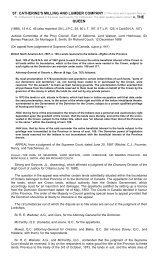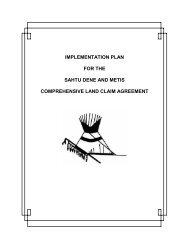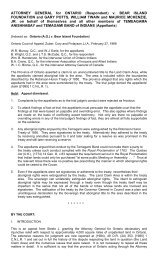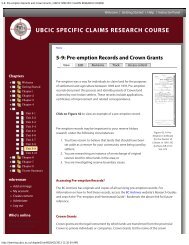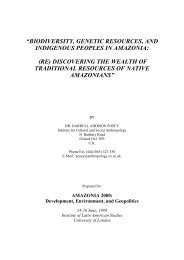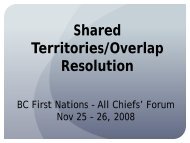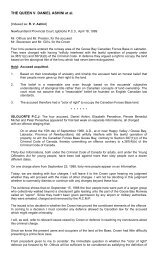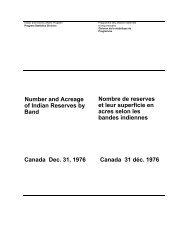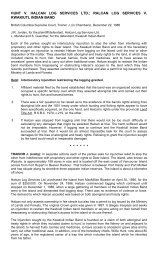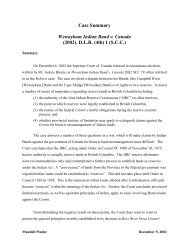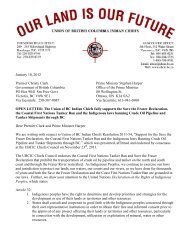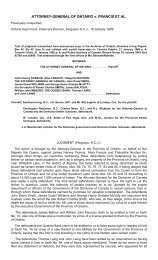Constitutional âPropertyâ and Reserve Creation: Seybold Revisited
Constitutional âPropertyâ and Reserve Creation: Seybold Revisited
Constitutional âPropertyâ and Reserve Creation: Seybold Revisited
You also want an ePaper? Increase the reach of your titles
YUMPU automatically turns print PDFs into web optimized ePapers that Google loves.
12 MANITOBA LAW JOURNAL VOL 32 NO 1of l<strong>and</strong> use on reserves is the very core of s. 91(24) jurisdiction. 41 Whether thisextends to areas more analogous to s. 109 (disposal of <strong>and</strong> deriving revenue froml<strong>and</strong>) is more controversial. 42 There is a fundamental difference between thesetwo things; it is totally irrational that “ownership” by a legislature should bringwith it l<strong>and</strong> use powers equivalent to immunity from zoning. Generally, regulationof l<strong>and</strong> use does not touch the l<strong>and</strong> unless it is excludes the owner. 43 For thelegislatures, ownership brings an ability to dispose of l<strong>and</strong> or to derive revenuefrom it, not to regulate l<strong>and</strong> use generally. Therefore, zoning (l<strong>and</strong> use generally)is not really something in relation to the l<strong>and</strong> itself <strong>and</strong> should have little ornothing to do with the prerogative over reservation.To create a reserve, one needs neither the power to regulate zoning, disposeof l<strong>and</strong>, nor to derive revenue from it. It is therefore not truly analogous to l<strong>and</strong>use regulation, or s. 109 powers. The power to dispose of a reserve for the benefitof Indians is a complex matter that is simply beyond the scope of this paper dueto its overlap with s. 109. To create a reserve, the federal power over l<strong>and</strong>s reservedfor Indians must simply relate to the use of public l<strong>and</strong>s <strong>and</strong> give it thecapacity to give exclusive rights to Indians. Clearly a power over “l<strong>and</strong>s reserved”relates to rights to exclude non-Indians from public l<strong>and</strong>s on its face.414243This really has more to do with powers of local government (zoning) than l<strong>and</strong> ownership orrelated rights of disposal <strong>and</strong> revenue. For some reason, both the case law on Indian reserves<strong>and</strong> also on federal l<strong>and</strong>s has not grasp ed this distinction at all. The Court in Derrickson v.Derrickson, [1986] 1 S.C.R. 285 at para. 41, [1986] S.C.J. No. 16 [Derrickson] cite to S.C.R.],held that the right to possession of l<strong>and</strong>s on an Indian reserve is the “very essence of” s.91(24) powers. This would seem to relate at least to provincial s. 92(13) jurisdiction overproperty <strong>and</strong> civil rights, if not also public l<strong>and</strong> ownership. See also Surrey (District) v. PeaceArch Enterprises Ltd. (1970), 74 W.W.R. 380 (B.C.C.A.) [Peace Arch], regulation of l<strong>and</strong> useon reserve is the core of s. 91(24) which is at least the provincial equivalent of local <strong>and</strong> privateor municipalit ies; <strong>and</strong> R. v. Isaac (1976), 13 N.S.R. (2d) 460 (N.S. C.A.) where huntingwas held to be a use of l<strong>and</strong> <strong>and</strong> so provincial laws ceased to apply.See Stoney Tribal Council v. PanCanadian Petroleum Ltd., [2000] A.J. No. 870, 2000 ABCA 209(Alta. C.A.) where federal royalty regimes relating to Indian Oil <strong>and</strong> Gas were paramount; thefederal government could derive revenue for Indians even if it was through a lease. But seeSmith v. R., [1983] 1 S.C.R. 554, 147 D.L.R. (3d) 237 where surrenders to Canada in trust tosell for Indians made those l<strong>and</strong>s unencumbered s. 109 l<strong>and</strong>s in the h<strong>and</strong>s of the province[Smith].See British Columbia v. Tener, [1985] 1 S.C.R. 533, [1985] S.C.J. No. 25 <strong>and</strong> Hamilton Harbour,supra note 20; but see “Negative Capability” supra note 3.



